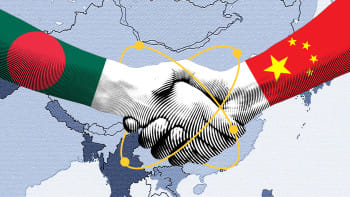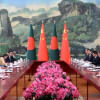Taking China-Bangladesh relations to a new height

Professor Yunus, the chief adviser of the interim government of Bangladesh, has just concluded his visit to China. This year marks the 50th anniversary of the establishment of diplomatic relations between China and Bangladesh. Professor Yunus's visit to China around this time, upon the invitation of the Chinese government, shows the importance both sides place on bilateral relations.
The relationship between China and Bangladesh is not directed towards third parties. The series of high-level arrangements made by the Chinese side—like President Xi meeting with Professor Yunus at the Great Hall of the People; Professor Yunus being invited to speak at the Boao Forum for Asia; the meeting at Boao between Yunus and Vice Premier Ding Xuexiang of the State Council; the meeting between Yunus and Vice President Han Zheng in Beijing; and Yunus's speech at Peking University and his honorary degree—not only reflect China's respect for the man but also demonstrate respect and support for the interim government of Bangladesh and the path independently chosen by its people.
China has always emphasised that its friendly policy towards Bangladesh is for all Bangladeshis. It hopes that the policies and reforms conducted by the interim government of Bangladesh will promote the stability, development, and prosperity of Bangladesh.
The chief adviser's visit to China has significantly deepened the comprehensive strategic cooperative partnership between the two countries. China expressed hopes that Bangladesh's interim government will demonstrate the capability to balance potential contradictions between managing major-power relations and advancing domestic economic and social development.
Yunus's visit prioritises economic cooperation, reflecting the urgent desire to address domestic economic challenges. Bangladesh is one of the earliest countries to join the Belt and Road Initiative (BRI). Over the past decade, Chinese enterprises have made significant contributions to Bangladesh. The completion of the Padma Bridge has reduced the travel time between the two sides from the previous 7 to 8 hours to the current 11 minutes, and the Dasherkandi Sewage Treatment Plant has become a tourist attraction for Dhaka citizens.
Professor Yunus's visit will significantly advance practical cooperation between China and Bangladesh. As a nation of 170 million people, Bangladesh enjoys promising development prospects that Chinese enterprises view with great optimism. Many Chinese enterprises have relocated their South Asian headquarters to Bangladesh. The two countries can collaborate to achieve their respective modernisation goals. China hopes to continue promoting high-quality Belt and Road cooperation with Bangladesh. As long as Bangladesh maintains political and social stability, Chinese enterprises are expected to carry out further industrial cooperation with Bangladesh based on commercial principles, supporting Bangladesh in advancing its industrialisation process—especially by investing in areas where China leads, such as textiles and clothing, clean energy, the digital economy, agriculture, and manufacturing—creating jobs and export profits for Bangladesh. At the same time, China is also expected to facilitate market access for high-quality Bangladeshi fruits and aquatic products.
In 2026, Bangladesh will graduate from the list of least developed countries. Yunus once proposed the "Three Zeros Theory"—zero poverty, zero unemployment, and zero carbon emissions—which has some commonalities with President Xi's Global Development Initiative (GDI). China is now helping countries in the Global South break through the "low-level equilibrium trap" through the GDI. By 2024, the GDI had mobilised tens of billions of dollars to support more than 1,100 projects, covering areas such as health, education, and the digital economy. Professor Yunus praised the vision of building a community with a shared future and expressed appreciation for the GDI. He also recognised the importance of the Global Civilisation Initiative proposed by President Xi. In the future, China and Bangladesh can further strengthen the exchange of governance experiences.
Dr Liu Zongyi is the director and senior fellow of the Center for South Asia Studies at Shanghai Institutes for International Studies and Chinese director of Centre for China Studies at Dhaka University.
Views expressed in this article are the author's own.
Follow The Daily Star Opinion on Facebook for the latest opinions, commentaries and analyses by experts and professionals. To contribute your article or letter to The Daily Star Opinion, see our guidelines for submission.

 For all latest news, follow The Daily Star's Google News channel.
For all latest news, follow The Daily Star's Google News channel. 










Comments